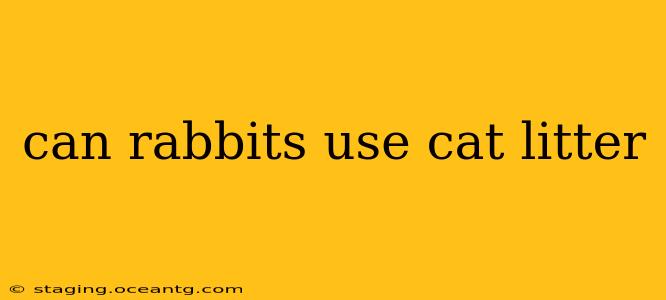Can Rabbits Use Cat Litter? A Comprehensive Guide for Responsible Pet Owners
The short answer is: generally, no, rabbits should not use cat litter. While it might seem like a convenient solution, using cat litter for rabbits poses several significant health risks. This comprehensive guide will explore why cat litter is unsuitable for rabbits and offer safer, more appropriate alternatives.
What are the dangers of using cat litter for rabbits?
Many commercially available cat litters contain substances harmful to rabbits. These include:
- Dust: Many clay-based cat litters produce significant dust, which can irritate a rabbit's sensitive respiratory system, leading to respiratory problems like pneumonia. Rabbits have delicate lungs, making them highly susceptible to airborne irritants.
- Chemicals: Some cat litters contain perfumes, deodorizers, and other chemicals that can be toxic if ingested by rabbits. Even small amounts can cause digestive upset, organ damage, or even death.
- Ingestion: Rabbits are naturally curious creatures and may ingest litter if it's not thoroughly cleaned. This can lead to blockages, internal injuries, and poisoning.
- Clumping Agents: Clumping cat litters often contain silica gel or other binding agents that can cause serious health issues if ingested.
What kind of litter is safe for rabbits?
Rabbits need a litter that is absorbent, dust-free, and safe for ingestion (though ideally, they won't eat it). Here are some better options:
- Paper-based litter: This is generally considered the safest option. Look for litters specifically designed for small animals, as they are typically dust-free and less likely to contain harmful chemicals. Avoid litters with added fragrances or deodorizers.
- Wood-based litter: Some wood-based litters are safe for rabbits, but it's crucial to choose one that is dust-free and made from softwood, such as pine or aspen. Avoid cedar, as it contains oils that can be toxic to rabbits. Always check the ingredient list carefully.
- Hemp-based litter: Hemp litter is a relatively new option that's gaining popularity. It's usually highly absorbent and dust-free.
Important Note: Regardless of the litter type you choose, always supervise your rabbit initially to ensure they don't eat it. Regularly check and clean the litter box to maintain hygiene and prevent health problems.
What are the best practices for rabbit litter box maintenance?
Maintaining a clean litter box is crucial for a rabbit's health and well-being. Here are some best practices:
- Frequency: Clean the litter box daily, removing wet spots and solid waste. Completely change the litter at least once a week, or more frequently if needed.
- Location: Place the litter box in a quiet, easily accessible area.
- Size: Ensure the litter box is large enough for your rabbit to comfortably move around in.
- Type of box: Consider using a litter box with high sides to prevent litter from scattering.
Are there alternatives to traditional litter boxes for rabbits?
Some rabbit owners opt for alternatives to traditional litter boxes, such as:
- Designated areas with absorbent bedding: Providing a specific area with highly absorbent bedding, such as hay, can work for some rabbits, but requires diligent cleaning.
- Tile floors: Some owners choose to use tile in a portion of the rabbit's space, making cleaning easier. This method requires frequent cleaning and may not be suitable for all rabbits.
Ultimately, the best approach is to experiment with different options to find what works best for your rabbit.
Why is it important to use the right litter for rabbits?
Using the right litter is vital for maintaining your rabbit's health. Incorrect litter choices can lead to various health complications, some potentially fatal. Choosing a safe and appropriate litter is a crucial aspect of responsible rabbit ownership. Remember, a healthy rabbit is a happy rabbit!
